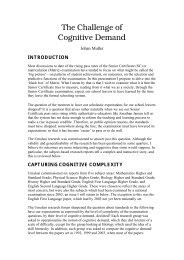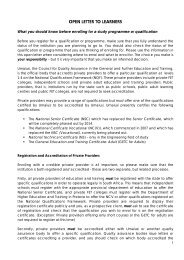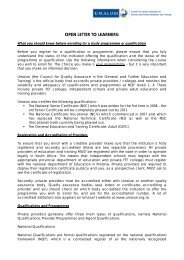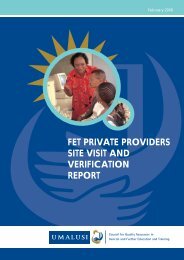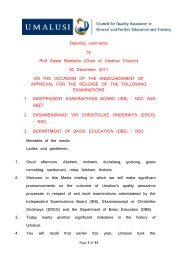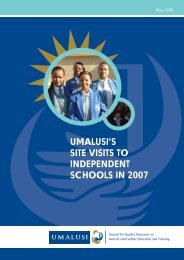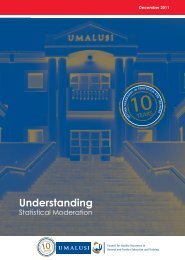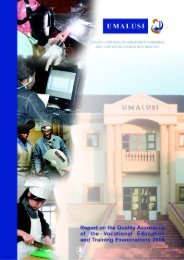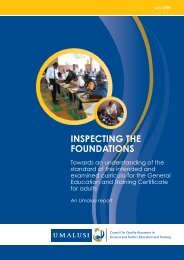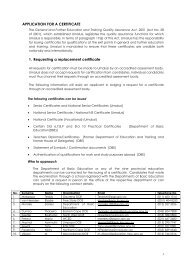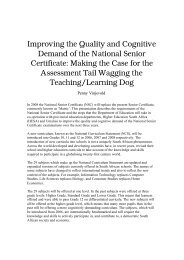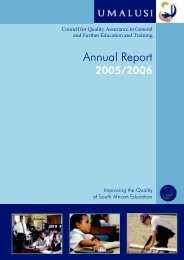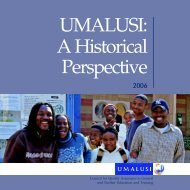Umalusi AET Report
Umalusi AET Report
Umalusi AET Report
- No tags were found...
You also want an ePaper? Increase the reach of your titles
YUMPU automatically turns print PDFs into web optimized ePapers that Google loves.
Section 6Closing observationsThe programme of site visits to private <strong>AET</strong> providers in 2007 has confi rmed various perceptions ofthis sector and provided a number of new insights. These points are drawn together here to inform<strong>Umalusi</strong>’s ongoing development of the accreditation process. The observations relate to aspects ofthe context and to <strong>Umalusi</strong>’s accreditation role.6.1 ASPECTS OF THE CONTEXT OF <strong>AET</strong>INTENSE LACK OF ECONOMIC AND SOCIAL POWERThe importance of <strong>AET</strong> has long been recognised. It is seen as a signifi cant building block for thequality of life and the prosperity of South Africa. Yet, for a whole complex of reasons, <strong>AET</strong> hasbeen marginal and has chronically been called “the Cinderella of education provision”. In spiteof general political recognition of its importance, an array of problems has proved intractable.Current ministerial attention to adult literacy and ABET is therefore welcome and promises someimprovement.However, many of the problems of <strong>AET</strong> are widespread internationally and are related to deeplyrooted perceptions and standard practices in education provision and to the lack of economicand social power on the part of the majority of the clientele for adult education. Not least of theproblems, though, is the sheer diffi culty of the logistics of quality <strong>AET</strong> provision. For quality, thesector must of necessity be responsive to multiple local conditions and individual needs. Apartfrom the major curricular challenges which this poses, the problems of timing and locality are oftendaunting. These issues all play into the diffi culty of identifying, training and retaining staff – who alltoo often have to be employed on a part-time and temporary basis with conditions of service thatneed to be supplemented by a powerful spirit of mission if there is to be sustained quality. On thewhole, only rare organisations manage to maintain high levels of quality delivery in <strong>AET</strong>. The sector istherefore certain to remain in need of special care.ACCREDITATION PROGRESS IN RELATION TO CONTEXTSIt is not surprising then that (compared with other sectors of private provision that <strong>Umalusi</strong> isconcerned with) a large proportion of private <strong>AET</strong> providers is making poor progress towardsaccreditation. The site visit programme has shown clearly the syndrome of limited permanence,relatively weak institutional identity and stability and fi nancial insecurity refl ected in dependenceon various forms of contracts (from employers, donors or SETAs) with only minor support via studentfees. There are exceptions to some aspects of this pattern, and certain providers have managed tobuild impressive track records.DIVERSE PROVISIONThree striking features of the context of <strong>AET</strong> provision are the salience of commercial factors, theimpact of formalisation and the wide-ranging offerings of <strong>AET</strong> providers. There has been a steadyloss of donor funding for the sector, linked to political shifts since the mid-1990s and a world trendto shift from the status of funded NGOs to that of non-profi t businesses or even of profi t-makingbusinesses. This has meant that organisations are obliged to be competitive in responding totenders and other opportunities and to be far more strictly accountable for achievement againstfunded objectives than in the past. While welcome in some respects, these pressures can proveprofoundly damaging when the institutional capacity to respond to them is lacking, and mightdistort the spirit of mission and the quest for professional quality.31



